a-, ab-, abs-
(Latin: prefix; from, away, away from)
This prefix is normally used with elements of Latin and French origins (abs- usually joins elements beginning with c, q, or t).
The form ab- is regularly used before all vowels and h; and it becomes a- before the consonants m, p, and v. The prefix apo- has similar meanings.
This list is a very small sample of the multitudes of a-, ab-, abs- prefixes that are available in dictionaries and those in this unit are only meant to present a few examples.
2. Pertaining to how a reference to something is difficult to understand: Lynn had difficulty comprehending the doctor's abstractly presented diagnosis of her illness.
2. Pertaining to something difficult to penetrate; incomprehensible to one of ordinary understanding or knowledge: Some scientists may understand Einstein's theory of relativity, however for most nonscientists, it continues to be an abstruse collection of surrealistic or unrealistic ideas.
3. Etymology: from Latin abstrusus, past participle of abstrudere, "conceal"; literally, "to thrust away", from ab-, "away" + trudere "to thrust, to push".
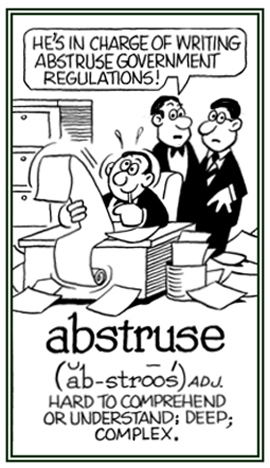
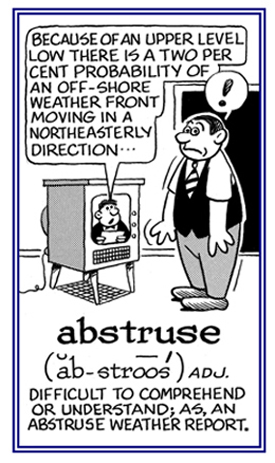
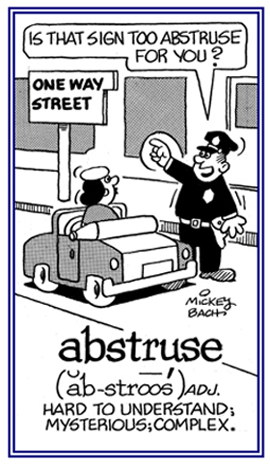
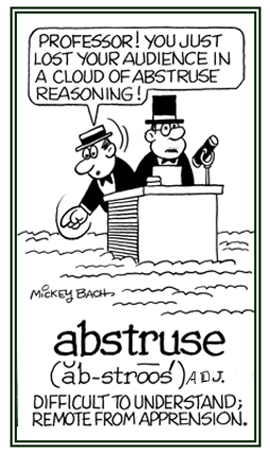
Go to this Word A Day Revisited Index
so you can see more of Mickey Bach's cartoons.
2. Regarding how something is done in a concealed way: Sally abstrusely designed secret pockets in the jacket she was making so the one who wore it could hide cash and small valuables without anyone else being aware of it.
3. Concerning how a subject matter is difficult to be comprehended or understood, as opposed to what is obvious: Jeremy's theory seems to be that the more abstrusely he writes the more famous he will become.
2. Knowledge that is obscure and little known; a matter that is difficult to understand; profoundity; The university students were confused by the professor's abstrusenesses in some of his lectures about philosophical and religious beliefs and practices.
2. Pertaining to something that lacks any meaning that would give purpose to life: The young woman's absurd lifestyle seemed pointless and worrisome to her parents.
3. Concerning a condition of living in a meaningless universe where life has no purpose, especially as a concept in some twentieth-century philosophical movements: Jeremy, the university student, was determined to study the seemingly absurd lives of famous poets who had died young.
4. Relating to, or manifesting, the view that there is no order or value in human life or in the universe: The absurd theory about the meaninglessness of mortal existence did not appeal to James when he was attending the special lecture presented by a religious leader.
5. Descriptive of incongruity, senselessness; pertaining to a state of fabrication or untruth; unreasonable as to be laughable or ridiculous: The absurd quality of the theater production seemed to confuse the critics who were not sure if the drama was serious or just a joke.
Something is absurd when it is contrary to the first principles of reasoning. The statement that a part of something is greater than the whole is considered to be absurd.
Being monstrous and preposterous both refer to what is overwhelmingly absurd.
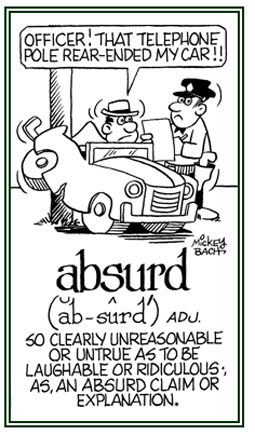
Go to this Word A Day Revisited Index
so you can see more of Mickey Bach's cartoons.
2. An act or instance of the ridiculous: The absurdisms which were portrayed on the stage upset the audience who expected a better production from the director and actors.
2. A reference to that which is inconsistent with reason, logic, or common sense: The absurdist student told his teacher that the dog had eaten his homework.
2. A person who acts or presents characteristics of being ridiculous: Mr. Potter, the politician, was described by some people as another in a series of absurdists who were candidates for mayor.
2. Anything that is considered to be lacking in order and meaning: For some students, mathematics is an absurdity and is an illogical process.
2. Descriptive of something ridiculously unreasonable, unsound, or incongruous: Mr. Anderson, the drama teacher, commented about the absurdness of the new play which was being developed by the students in his class.
2. A lifestyle with more than adequate material provisions: Barry's family has abundances of different homes around the world as well as all of the luxuries that can be obtained for them.
3. A fullness of spirit that overflows: The sermon by the preacher was filled with an abundance of goodwill and kindness.
4. The extent to which an element is present in the earth or in a rock: There is a rumor of an abundance of minerals hidden in the abandoned mine.
5. The proportion of one isotope of an element, expressed by number of atoms, to the total quantity of the element: Mr. Young, the chemistry teacher, urged his classes to study and to understand the abundance factors of the chemical components.
6. Etymology: nothing suggests great abundance more vividly than overflowing waves; and that is the literal meaning of the word abundance.
In Latin, unda means "wave", poetically "sea". The Romans combined ab, "from", and unda into the word abundare, "to overflow"; literally, "to come from the waves" or "from the sea"; applied to anything very plentiful.
The stem of abundare resulted in the English verb "to abound", and a derivative provided the noun abundance. Inundate, "to flood", also comes from unda, as does undulate, "to move like the waves".


